Mohloai Mpesi
The Central Bank of Lesotho (CBL) has set a momentous “green environment†tone for local commercial banks.
The Bank emphasised a need for financial investments towards Climate Change.
CBL gathered local financial institutions under one roof and correct channels for green finances as well as investments in environmentally friendly projects were the centre of talks.
Some of the issues raised during the discussions involved the challenges surrounding climate finance, what other countries are doing and what could be the solutions to the status quo.
The Governor of CBL, Dr Emmanuel Letete, indicated that it was time to act on the impact of climate change which has been overlooked for a long time.
“These issues of climate change affect us in our day-to-day lives and they are the issues that perhaps central banks and other people in the recent past had ignored, but had come to the fore as far as money is concerned.
“For some time now Lesotho has been experiencing severe effects of climate change and food production has been negatively affected due to either too much or delayed rains. The country’s infrastructure similarly has been severely dilapidated due to heavy rains. We can’t ignore the effects of climate change anymore,†he said.
Letete stressed the importance of the financial sector identifying challenges and interventions that would improve the resilience of the sector to climate shocks.
He urged the financial sector to position itself so as to seize any potential opportunities that may arise in the war against climate change.
Deputy Principal Secretary in the Ministry of Finance and Development Planning, Rethabile Maluke, stated that the scourge of climate change can only be defeated if there is a scaling-up of finances to establish green plant projects.
“Climate Change has given rise to different challenges, but equally has an impact on the economic performance across countries and raises the demand for global unity to develop mitigation and adaptive initiatives.
“Climate change has become one of the greatest environmental threats on the planet and has threatened the livelihoods and the majority of the global population,†she said.
She continued that smallholder farmers are on the front line of the harsh climate change effects which impact every aspect of their daily lives.
“…from the money they earn, their crops, to the food they put on the table for their families.â€
“It is therefore important for both developed and developing economies to take urgent measures and initiatives that will mitigate, enable adaptation and build resilience against climate change shocks.
The DPS said the move can be attained through long-term investments and infrastructure financing “particularly green energy projects that have a potential to mitigate climate change shocks and adaptation beyond the medium terms.â€
“Looking at Lesotho’s perspective, there is a dire need for development and scaling up of financing and investments that yield our environmental benefits. This requires a holistic framework encompassing relevant regulatory policies and new financial investments,†she explained.
The Development Finance Manager of the Lesotho National Development Corporation (LNDC), Semethe Raleche disclosed that the Corporation has already established projects around underpinning the agricultural sector.
He emphasised that Lesotho is subjected to the severe impact of climate change particularly the agriculture sector which is hard hit.
“In 2018, the LNDC decided to channel some of its funds towards the development of the agricultural sector. We are practising subsistence farming and are ready to jumpstart the economy and move into commercial agricultural and agro-processing industries. Our thinking already was climate smart,†he said.
According to the United Nations Development Programme (UNDP) Climate Change Specialist, Exellent Hachileka, there is a diverse set of systems that are regulated in different jurisdictions for trading greenhouse gas pollution rights such as the carbon markets.
He said the rights, which are called ‘allowance permits’ are commodities which are globally traded and gives the bearer the right to emit an equivalent amount of CO2 emissions.
“Carbon credits are like permits but are fundamentally different in that they are generated over time – once a project gets implemented and the reductions are audited.
“In many markets, these carbon credits can be used in lieu of allowances for compliance to targets that have been placed on industrial facilities or sovereign countries,†Hachileka said.
He continued that potential of green bonds was estimated at €29.4 trillion over 2030; $522 billion in 2021 and a total market size of over $2 trillion, while potential benefits of the green bond include; the additional source of finance and investor diversification (institutional investors; ESG and public investors mandated to invest in green securities; domestic retail investors).




